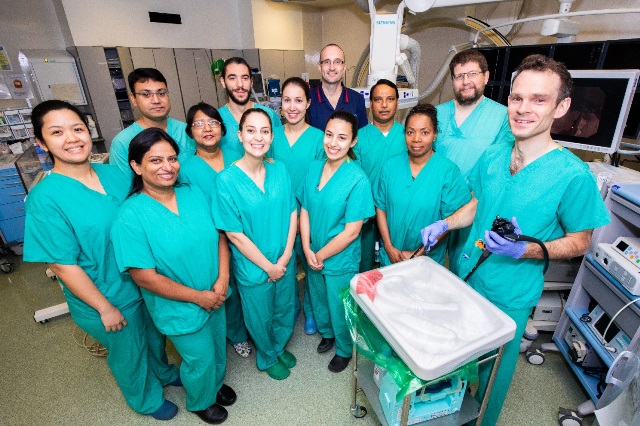
Serious conditions, including bile duct cancers, are being spotted more quickly thanks to a state-of-the-art device now being used at the Royal Free Hospital.
The Royal Free is just one of a handful of hospitals currently using the SpyGlass cholangioscopy system, which helps diagnose and treat a range of conditions that result in narrowing or obstruction within the liver and pancreas, including bile duct tumours, and biliary and pancreatic stones.
These are conditions which can cause abdominal pain, jaundice or other abnormalities that show up in blood tests or scans. For some patients conventional methods of diagnosis or treatment don’t always work, and these patients can now be considered for SpyGlass.
The device is a very thin steerable endoscope with a miniature camera on the end which can be inserted into the bile duct to provide views inside a patient’s liver and biliary tree. Conditions that cause bile duct strictures (narrowings), including biliary tumours, can now be detected and diagnosed more quickly and easily. It also makes it possible to give carefully targeted lithotripsy (shock wave) treatment to break down stones causing blockages in the liver and pancreas.
If a stricture is suspected to be due to cancer, biopsy forceps can be passed down the cholangioscope to take samples directly from the abnormal areas, which can then be sent to pathologists to make a clear diagnosis.
Jonathan Potts, a liver and biliary endoscopy specialist based at the Royal Free Hospital, said: “SpyGlass is a very exciting development which increases the range of investigations and treatments we can offer our patients. The images from within the liver and pancreas are incredibly detailed and we anticipate significant benefits for our patients in terms of quicker and more accurate diagnosis.
“The technique also allows us to give highly effective, focused treatment to fragment bile duct stones that are too large to be removed by conventional means. This will reduce the number of procedures these patients require, which should also mean fewer complications and reduced lengths of hospital stay. We’re fortunate to work with a highly dedicated team of expert endoscopy nurses, who have got to grips with the new equipment amazingly quickly.”
Dr Doug Thorburn, biliary endoscopist and clinical director for liver services at the Royal Free, commented: “Establishing the SpyGlass service is a fantastic achievement for the department, which wouldn’t have been possible without the support, skills and enthusiasm of our expert nurses, radiographers, anaesthetic and administrative teams, as well as the backing of the operations team. It has been a great joint effort and we are immensely grateful for everyone's support.”
PIC: SpyGlass team members including Jonathan Potts (far right) and Dr Thorburn (second from right)
 Translate
Translate